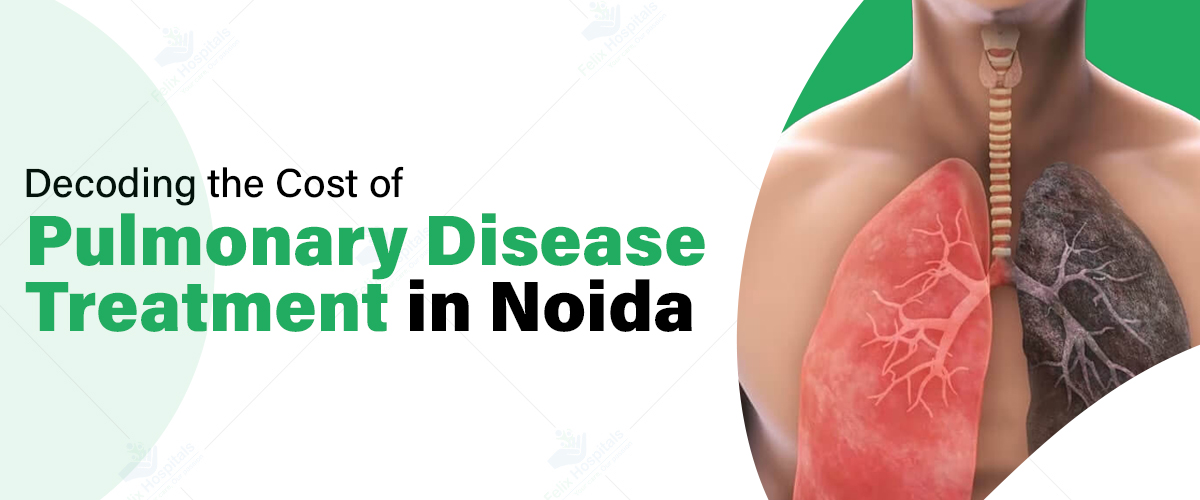
Subscribe to our

Pulmonary diseases encompass a broad spectrum of conditions affecting the lungs and respiratory system, including asthma, Chronic Obstructive Pulmonary Disease (COPD), lung cancer, and interstitial lung disease. In Noida, a city renowned for its advanced medical infrastructure, the cost of managing these conditions varies widely based on several factors. While treatments for pulmonary diseases can involve lifestyle adjustments, medications, and advanced procedures, the financial implications depend on the specific condition, severity, and chosen healthcare facility. Understanding these costs is crucial for effective planning and budgeting for treatment.
For more information about Pulmonary Disease Treatments and costs, or to schedule a consultation. Call now - +91 9667064100.
Here's a breakdown of the typical costs associated with various aspects of pulmonary disease treatment in Noida:
| Minimum Cost | 500 |
| Maximum Cost | 15,000 |
| Average Cost | 7,000 |
| Minimum Cost | 1,00,000 |
| Maximum Cost | 3,00,000 |
| Average Cost | 1,50,000 |
Diagnostic Tests:
Chest X-ray: ₹500 to ₹1,500
CT Scan of the Chest: ₹3,000 to ₹7,000
Pulmonary Function Tests: ₹2,000 to ₹5,000
Bronchoscopy: ₹8,000 to ₹15,000
Medications and Therapies:
Inhalers: ₹300 to ₹1,500 per month, depending on the type and brand
Oxygen Therapy: ₹2,000 to ₹5,000 per month, including the cost of equipment rental
Medications for Chronic Conditions: ₹1,000 to ₹5,000 per month, based on the specific drugs prescribed
Hospitalization:
Private Room: ₹3,000 to ₹10,000 per day
General Ward: ₹1,500 to ₹5,000 per day
ICU Admission: ₹10,000 to ₹25,000 per day, depending on the facility and level of care required
Surgical Interventions:
Lung Surgery: ₹1,00,000 to ₹3,00,000, depending on the complexity of the procedure and the hospital
The Pulmonology Treatment Cost in Noida is influenced by several factors:
Noida boasts a range of healthcare facilities specializing in pulmonary diseases. Choosing the right hospital involves evaluating:
1. Compare Healthcare Providers:
Research and compare costs between private and public hospitals. Choose facilities that offer the best value for your needs.
2. Leverage Insurance Coverage:
Review your insurance plan to understand coverage for diagnostic tests, treatments, and medications. Maximize your benefits and inquire about coverage options for specific treatments.
3. Opt for Generic Medications:
Ask your healthcare provider about generic versions of prescribed medications, which are often more affordable than brand-name drugs.
4. Seek Preventive Care:
Regular check-ups and early intervention can prevent severe complications and reduce the need for costly emergency treatments.
5. Utilize Discount Programs:
Look for patient assistance programs or discount offers on medications and treatments. Many pharmaceutical companies provide financial aid or reduced prices.
1. Expert Medical Team:
Felix Hospital boasts a team of best pulmonologist and respiratory specialists in Noida with extensive experience in diagnosing and treating pulmonary diseases, including COPD, asthma, and lung cancer.
2. Advanced Diagnostic Technology:
We utilize state-of-the-art diagnostic tools such as high-resolution CT scans, pulmonary function tests, and bronchoscopy to provide accurate and timely diagnosis.
3. Comprehensive Treatment Options:
Our facility offers a wide range of treatment options, including medications, inhalation therapies, oxygen therapy, and surgical interventions, tailored to meet individual patient needs.
4. Personalized Care Plans:
At Felix Hospital, we develop personalized treatment plans based on each patient’s specific condition and health goals, ensuring targeted and effective care.
5. Cutting-Edge Facilities:
Our modern and well-equipped facilities are designed to provide comfort and convenience during your treatment, with advanced technology to support high-quality care.
6. Multidisciplinary Approach:
We employ a multidisciplinary approach, involving specialists from various fields such as cardiology, nutrition, and physiotherapy, to address all aspects of pulmonary health.
Our dedicated team is here to provide expert care and support for all your respiratory health needs. Call us - +91 9667064100.
The cost of treating pulmonary diseases in Noida varies widely depending on the type and severity of the condition, the diagnostic and treatment options required, and the choice of healthcare facility. By understanding the typical costs and exploring financial assistance options, patients can better manage their healthcare expenses and focus on their recovery.
For personalized advice and treatment options, consult with healthcare providers at the best hospital for pulmonology treatment. They can offer tailored solutions to address your specific needs and provide guidance on managing costs effectively.
1. How much does it cost to treat lung disease?
2. What is the cost of a pulmonary function test?
3. What is the best treatment for pulmonary disease?
4. What are pulmonary symptoms?
5. Can pulmonary hypertension be cured?
6. How to reduce pressure in the lungs?
7. What is the best medicine for lung disease?
8. How do I make my lungs strong?
9. Which drink is good for the lungs?
10. What fruit is good for your lungs?
11. What home remedy is good for the lungs?